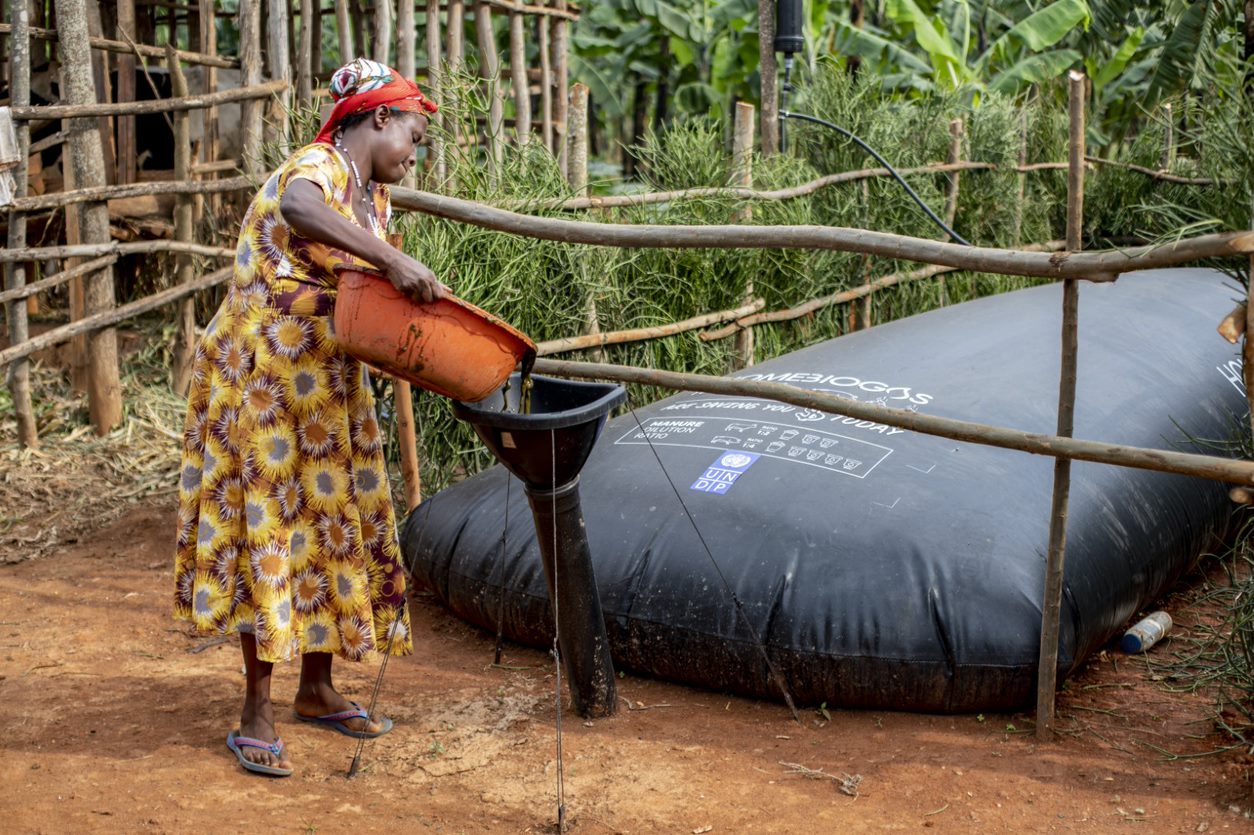By Bernardin Uzayisaba
Empower women with clean, affordable cooking energy.
July 31, 2023

Viviane insterting organic waste into the digester
One evening at about 7pm, on my drive home from work, I encountered a group of women and girls carrying heavy loads of sticks. Concerned, I stopped to speak with them and was deeply saddened to learn that they spend over four hours each day collecting firewood because they cannot afford clean and renewable energy sources for cooking. Among them were mothers carrying babies on their backs, and young girls, aged 10-15, burdened with this task.
Their stories resonated with my mother's struggles in the 1990s, trying to put food on the table, and how my siblings and I often had to miss class to fetch firewood.
Growing up, my mother fought tirelessly for my siblings and me to complete our education—and we did—yet I vividly recall how my female classmates were compelled to abandon their studies due to their responsibilities for collecting firewood. Even my mother was held back by this chore and had to forego participation in women’s cooperatives and income-generating activities.
The scarcity of clean cooking energy hinders women's social and economic aspirations. It worsens gender inequality, food insecurity, and poverty, raising the cost of living for poor households. Moreover, women and their daughters often face the dreadful risk of assault and rape when competing with men for firewood or while returning home late at night. Yet solutions to the over-dependence on firewood, such as home biogas, exist and could be scaled up. This would change the tough realities of "No energy, no meal" and "No firewood, no class.”
Shocking statistics from the recent national census show that 97.3% of households in rural areas and 83.8% in urban areas rely on firewood and charcoal for cooking. These figures are far below the national objective to reduce the percentage of households to 42% by 2024 as committed in the National Strategy for Transformation.
The crisis is expected to worsen due to a lack of investment in renewable cooking energy and limited financial solutions to make alternative technologies accessible, affordable, and scalable. Meanwhile, the war in Ukraine has further worsened the cooking energy crisis in Africa through the disruption of liquified petroleum gas supplies from Russia, driving up prices and increasing demand for biomass fuels such as charcoal and firewood.
As one promising solution to this crisis, in 2022 the United Nations Development Programme (UNDP) in Rwanda piloted the use of home biogas. The system can produce cooking energy from cow dung and water for five hours a day. Properly maintained, a biogas system can last for up to 10 years, making it a possible long-term solution for clean and affordable cooking energy. The pilot program installed biogas in 500 households in the Eastern province.
Biogas is a clean, efficient, and renewable energy source that can be used for cooking, lighting, and the treatment of wastewater. Its use can reduce indoor air pollution, improve sanitation, and limit the spread of waterborne diseases.
Unfortunately, however, at US$1000 per unit, home biogas systems are not yet affordable for poor households in Rwanda.
To change this, people need access to financial resources, skills, and technology to bring the cost down. Microfinance institutions can play a crucial role by designing loan products with affordable interest rates for women—since the data show that women have discipline in loan repayment, especially when provided with training in financial literacy. Another financing option is tapping into the carbon market, which could provide poor households with financial resources to switch from firewood to clean and renewable cooking energy.
Access to skills and technology is a crucial factor in the modern world, and women and girls in rural areas lack access to both. They need training in various renewable cooking energy solutions like anaerobic digestion, gas production, storage, utilization, solar energy, pallets, briquettes, and more. Acquiring skills in construction and installation is also essential for effectively setting up these systems. By gaining knowledge and skills, women can accelerate their transition to renewable energy and promote sustainable cooking practices.
<em>A techinician shows Tuyizere Alexia how to use a home biogas cooker</em>
The Government and its development partners should address the barriers that limit women’s access to technology and skills. This would increase their opportunities in income-generating activities and improve gender equality. It is only through inclusivity and equal opportunities that any Government can unlock the full potential of women and promote an equitable and prosperous society.
In the 21st century, it is unacceptable that young girls and women should have to sacrifice their education for household chores, or risk assault while helping their families. It is equally unacceptable for women to be burdened with hours of drudgery when they could be engaged in productive and creative activities or carving out time for themselves and their families.
It is up to policymakers, businesses, and development partners to put in place the practical solutions that will end these inequities and indignities, and in the process, empower women and girls, and benefit everyone.

 Locations
Locations



